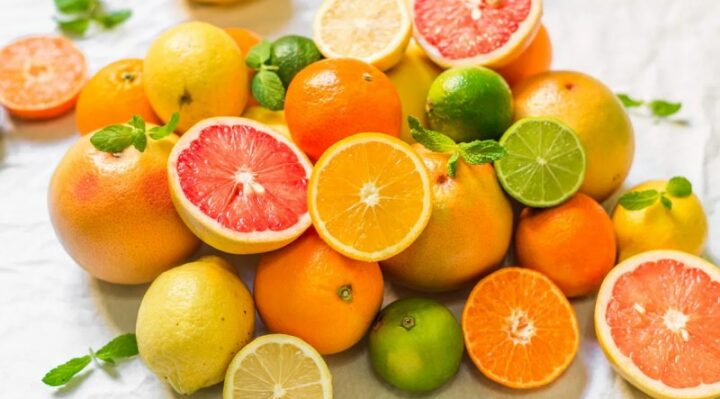
Maintaining a youthful and beautiful complexion requires collagen, a key protein that gives the skin structure, strength, and suppleness. It is the most prevalent protein in the human body and may be found in the connective tissues, skin, muscles, and bones. As we age, our bodies naturally produce less collagen, which causes wrinkles, drooping skin, and a loss of firmness. Add foods high in amino acids, vitamin C, and antioxidants, such as bone broth, seafood, poultry, eggs, citrus fruits, berries, leafy greens, garlic, nuts, seeds, and avocados, to your diet to increase your levels of collagen. These nutrients aid in the production of collagen and preserve radiant, healthy skin.
Bone broth: One of the best natural collagen sources is bone broth, which is high in collagen, amino acids, and minerals. The process of making it involves cooking connective tissues and animal bones, which releases minerals and collagen into the broth.
Fish and shellfish: Omega-3 fatty acids and collagen, found in fish like salmon, tuna, and shellfish, support the elasticity and suppleness of skin. While the collagen in fish preserves the structure of the skin, the omega-3s assist lower inflammation and shield the skin from UV rays.
Chicken: Especially for areas like the skin and cartilage, chicken is an excellent source of collagen. Rich in proteins that maintain the structure of the skin are the connective tissues found in chickens. Frequent consumption of chicken can help the body produce more collagen, which will result in skin that is firmer and more resilient.
Eggs: Particularly the whites, which are high in proline, an amino acid required for the synthesis of collagen. Proline is essential for preserving the hydration and suppleness of the skin. Eating eggs can help your skin seem younger and healthier by promoting the body’s natural process of producing collagen.
Citrus fruits: Vitamin C, which is necessary for the synthesis of collagen, is abundant in oranges, lemons, limes, and grapefruits. Potent antioxidant vitamin C both prevents damage from free radicals and encourages the skin’s synthesis of collagen.
Eggs: Particularly the whites, which are high in proline, an amino acid required for the synthesis of collagen. Proline is essential for preserving the hydration and suppleness of the skin. Eating eggs can help your skin seem younger and healthier by promoting the body’s natural process of producing collagen.
Citrus fruits: Vitamin C, which is necessary for the synthesis of collagen, is abundant in oranges, lemons, limes, and grapefruits. Potent antioxidant vitamin C both prevents damage from free radicals and encourages the skin’s synthesis of collagen.
Berries: Rich in antioxidants and vitamin C, strawberries, blueberries, raspberries, and blackberries encourage the formation of collagen. Berries’ strong antioxidant content helps shield the skin from environmental damage and oxidative stress.
Leafy greens: Chlorophyll, found in spinach, kale, and other dark leafy greens, has antioxidant qualities and may boost the formation of collagen. In addition, these greens are a great source of vitamins and minerals that promote healthy skin overall. Frequent consumption of leafy greens can help increase collagen levels, enhance skin suppleness, and shield the skin from environmental stresses and free radical damage.
Garlic: Has lipoid acid, taurine, and sulphur, which aid in the repair of damaged collagen strands. Sulphur from garlic helps to support collagen synthesis, and lipoid acid and taurine help to preserve and repair the skin’s structure.
Nuts and seeds: Zinc and copper, which aid in the synthesis of collagen, are found in almonds, cashews, chia seeds, and flaxseeds. These nutrients are essential for preserving the strength and flexibility of the skin. Additionally high in antioxidants and good fats that nourish and shield the skin from harm are nuts and seeds.
Avocados: Rich in good fats and vitamin E, avocados support the integrity of collagen and hydration in the skin. Avocados include healthy fats that help to maintain the hydration and flexibility of the skin, and vitamin E is a potent antioxidant that shields the skin from damage caused by free radicals.


